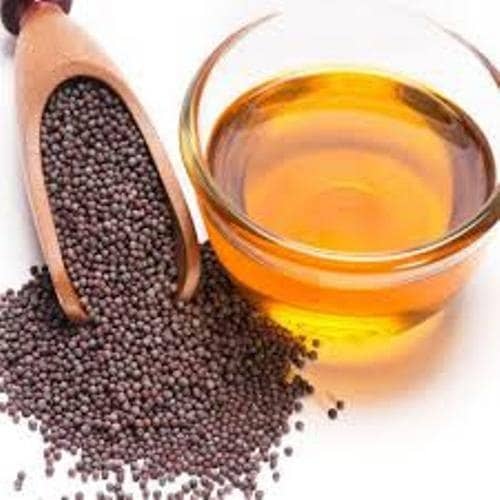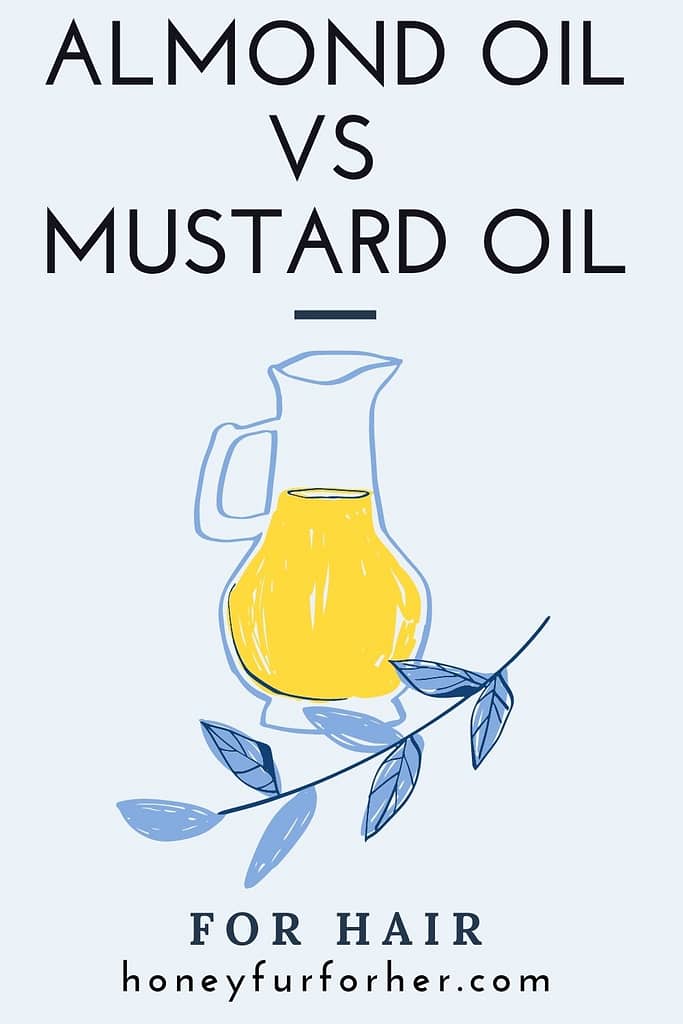Those who love oiling hair and know its immense benefits would relate to conundrums that come so naturally with so many options of oils provided by Mother Nature. Questions related to oils like “Is Mustard oil or almond oil better for hair?” are quite eminent. Why not explore and get suitable answers here today? In reality, both these oils are amazing when it comes to hair health but there are a few key differences and points to keep in mind before using them to reap maximum benefits.
While mustard oil helps in deep conditioning of scalp and hair follicles, almond oil is filled with the goodness of magnesium, calcium and zinc; deficiency of which can lead to weak hair. Almond oil is hydrating and nourishing, keeping the scalp moisturised.

The Benefits of Almond oil For Hair
Sweet Almond (Prunus Amygdalus / Prunus Amygdalus) aka just Almond in common terms is seed of a plant native to Iran and the Middle East. Another variety of Almond by the name of bitter almond (Prunus Amara) also exists which is not usually used for oil extraction.
Sweet almond oil is known for its beneficial properties like softening and nourishing effect for skin and for hair care. For this reason, almond oil is used in a wide range of cosmetic products. It is also has its use in aromatherapy as a Carrier oil. Due to its nutritional benefits, it is also widely included in culinary purposes throughout the world, especially for making sweet foods.
Sweet Almond Oil for Dry Scalp And Dandruff
Almond oil is highly hydrating to the scalp and hair roots. It deeply penetrates and moisturizes the scalp which helps in reducing dryness and flakiness of the scalp. This reduces itching and dandruff which is a direct result of dryness and accumulation of dead skin cells on the scalp. Owing to its emollient nature, Almond oil loosens the grip of topmost layer of dead cells and nourishes the scalp within deeper layers.
Plus its antioxidant properties help reduce greying of hair.
Almond Oil for Hair Fall Control
Almond oil contains biotin, an essential B-Vitamin, deficiency of which can lead to hair loss. These days Biotin is given as a supplement in many hair loss treatments. Along with biotin, sweet almonds are rich in Vitamin E, magnesium and zinc, all of which are essential for increasing the strength of hair and reducing hair fall and thinning.
A study showed that Vitamin E supplementation (Tocotrienols) for 8 months in patients suffering from alopecia increased rate of hair growth to 34.5%.

What Ayurveda Says About Almond?
According to Charak, hair is the sub tissue or sub category (upa dhatu) of bone marrow (majja dhatu). It is also considered to be a byproduct of the Reproductive tissue (Shukra dhatu).
Three stages of hair care are described in Ayurvedic texts:
- Kesha Sanjanana (Origin of hair),
- Kesha Vardhana (Growing the hair and maintaining its density and thickness),
- Kesha Ranjana (Giving black and dark colour to the hair).
The Sanskrit name for Almond is Vatama and it is described to be one of the natural foods necessary for Kesha Sanjanana. The foods and herbs which nourish and strengthen the shukra and majja dhatu are considered good for hair health.
Almond is considered very beneficial for all vata related disorders due to its properties which are hot and slimy which is opposite to those of vata dosha (dry and cold). Hair loss, dry hair, breakage, split ends, flakiness of scalp are all resultants of vitiated vata, for which consuming almond or applying its oil on the scalp is extremely beneficial.
Ayurvedic Properties Of Almond:
Veerya (potency): Usna (Hot)
Guna (Quality): Snigdha (Slimy), Guru (Heavy)
Vipaka (Transformation after digestion): Madhura (Sweet)
Rasa (Taste): Madhur (Sweet)
Karma (Properties): Vatahara (pacifies vata), Virya (Aphrodisiac), Balya (Provides strength), Pitta kara (Increases pitta dosha)
How to use almond oil for hair?
Since almond oil is heating in nature and is also quite expensive, it is not meant to be used in large quantities on the scalp. Traditionally it has always been either used in combination with other oils like coconut oil or used in a very little quantity when used standalone.
Just apply and massage a few drops of almond oil (cold pressed virgin only) on the hair roots at scalp using the tip of your fingers. Do this an hour before taking a shower. Follow it up with a wash using mild shampoo or Ayurvedic shampoo (this is the one I use personally on regular basis) after an hour.
If you want to properly oil hair covering full scalp root to tips, it is best to mix 1/3rd portion of almond oil with 2/3rd portion of coconut oil before application. Rinse clear after 2-3 hrs (Minimum 1 hr). If you don’t belong to a dominant vata type personality, it’s best for you to mix almond oil with coconut oil and then use it as mentioned above while Vata people benefit more with Almond oil alone.
The Benefits Of Mustard Oil

Mustard oil, also known as Sarson ka tel in India, finds its primary use in our kitchens to flavor dishes. While it is easily available in market, it is often overlooked as a product for hair care regimens due to its thick nature.
Amazing power of Mustard oil lies in the abundance of natural fats present in it which make it an ideal contender for hair care routines. It is great for combating dryness, frizz and brittleness of hair. Plus it manages split-ends; repairs hair damage caused by heating tools or sun and also prevents breakages.
Mustard oil for Scalp Inflammation:
Allyl Isothiocyanate, a compound present in Mustard oil is a potent anti-inflammatory agent as shown by the Studies recently. This property makes Mustard oil beneficial for treating dermatitis, eczema, folliculitis and psoriasis of scalp and hair. These all are inflammatory diseased conditions of scalp which are also a major cause of hair fall.
In rural areas of Gujrat, karanj seeds are crushed and boiled in mustard oil and then applied on scalp to remove dandruff.
Mustard oil as Antibacterial And Antifungal Agent:
Mustard oil is enriched with anitbacterial, antifungal and antimicrobial powers. Thanks to these powers it can beat fungal infections, acne and pimples of scalp. Now there are even Research to show and prove that.
Powerhouse of minerals, antioxidants and vitamins:
Mustard oil is replete with antioxidants, magnesium, calcium, zinc, selenium and iron along with Vitamins A, D, E and K (all fat-soluble vitamins) and beta-carotene. These boost hair growth, health and shine.
Combating Premature Grey Hair
Mustard oil has been used since ages to reverse premature grey hair or even delay greying. It was a part of daily hair care ritual in most Indian households in past when modernisation didn’t occur and the people of that generation did not suffer from any premature ageing of hair which is a big proof of its effectiveness.
Selenium and antioxidants present in the oil help against early damage. Thus regular use has been linked to increase melanin production which gives natural black color to hair.
What Ayurveda Says About Mustard Oil
Mustard oil is known as sarshapa taila and is said to be hot and penetrating in nature. It aggravates pitta and is not recommended for people with dominant pitta body type. It is good for balancing both Vata and Kapha. It increases blood circulation and reduces inflammation on application on skin and head.
Mustard oil with garlic for hair?
Many people these days seem to be recommending garlic oil prepared with cooking garlic in mustard oil for applying on hair. This is not recommended for pitta people and for those suffering from pitta diseases (read in detail about pitta type people) like blood related diseases, skin problems. It is a very good oil for muscular pains like back pain due to anti inflammatory properties of mustard oil and garlic, but it will become even more heating and pitta aggravating.
How to use Mustard Oil For Hair?
Mustard oil has been traditionally used for stand-alone application all over scalp followed by massage and then leaving it thus for 30-40 minutes minimum before hair wash. However there is no harm if you keep it on hair overnight and wash hair next day morning.
Another addition to this treatment can be an added warm towel wrapped over hair. To prepare warm towel, drop a towel big enough to cover full scalp in hot water and then wring it. Use this immediately to wrap on hair and let it sit for 15 mins.
This hot-towel method helps to open hair pores and push the oil right where it is needed. Wash towel with soap, dry and keep aside for next usage. Every time I use this method, it imparts luxurious shine and nutrition to my hair that is so noticeable.
Below we recommend a few ways mustard oil can be used:
I. Mustard Oil with Aloe vera:
Mix 1 tsp of aloe vera gel to 2-3 tsp Mustard oil and form a paste by whisking together. Apply this mix to scalp and hair and leave for a minimum for 30-40 mins. Use mild shampoo to rinse it off. Added benefits of aloe vera, make this mask more enriching and rewarding by reversing untimely damage.
II. Lemon juice in Mustard oil:
Take a few drops of one lemon and 1 tsp Fenugreek powder in a bowl. Next add 3-4 tsp of Mustard oil to make a paste. Leave on hair for 30-40 mins and rinse off preferably with a natural Ayurvedic shampoo. Fenugreek strengthens hair and helps repair damage too.
III. Yogurt hair pack with mustard oil:
Mix yogurt and mustard oil 1:1 ratio (or just so it is not very runny and is manageable) in a bowl. Whisk it to form a smooth cake-batter like consistency. Apply on hair and scalp sparingly and cover it with a wringed hot-wet-towel for 15 mins. Remove towel and leave for 30-40 mins thereafter.
Then it can be washed off with natural shampoo.This way benefits of yogurt are also added to accentuate the beneficial effects like nourishment, absolute removal of dandruff and dry scalp, soothing action on scalp and hair and incredible luster.
Frequently Asked Questions
Can I mix the Almond oil with mustard oil?
No you should not mix both the oils. It is recommended to mix almond oil or mustard oil separately with coconut oil as it is cooling in nature compared to heating nature of both almond or mustard oil.
Are there any side effects of Mustard or Almond oil?
Mustard oil may give a pungent smell, cause eye irritation and clog pores if applied in excess. Internal use of mustard oil in case of blood related diseases is strictly not advised.
According to healthline[.]com, using almond oil before heat styling your hair can be dangerous. The oil will heat up and can potentially burn the hair follicles.
Did you find this post useful? Would you like to get back to it later? Save THIS PIN below to your Pinterest Natural Living or Ayurveda board!

